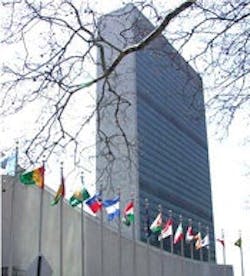World Falls Behind on Clean Water Goals
Though keeping with U.N. clean water and sanitation goals would provide improved health benefits and growth potential, the world as a whole is falling behind on these goals, the head of a U.N. commission said Tuesday.
"The case should be obvious, the gains will be huge," said Boerge Brende, who will chair U.N. talks in New York from April 14 to 30 to review progress toward meeting targets for improved water and sanitation set at a 2002 Johannesburg Earth Summit.
However, to date only about 50 percent of developing nations are on track to meet the goal of halving the proportion of people with no access to fresh water by 2015. At this rate, 1.2 billion people who should have fresh water by 2015 may not.
Sanitation is an even bigger problem. Brende said that only about 30 percent of developing nations are in line to meet the goal of providing sanitation -- such as sewage and waste water disposal systems -- to 2.4 billion people by 2015.
"We have a long way to go to reach the 2015 goals," Brende, who is chair of the U.N. Commission on Sustainable Development and also Norway's Environment Minister, said. "It's still possible, but more needs to be done, and faster."
Meeting the water and sanitation targets was a precondition for achieving the so-called Millennium Goals set by a U.N. summit in 2000. World leaders agreed to halve the proportion of people who live on less than $1 a day, taking more than a billion people out of the most abject poverty by 2015.
"If we don't reach the water targets, we can't reach other goals," Brende said. Many people in Africa, especially women, spend hours daily fetching water or foraging for firewood. That leaves little time for education or more productive work.
Source: Reuters
